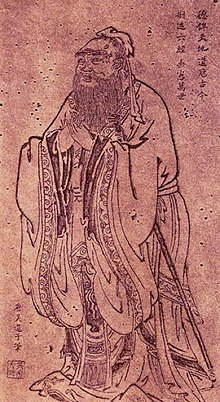
Back Konfusius Afrikaans Konfuzius ALS ኮንግ-ፉጸ Amharic Confucio AN Confucius ANG कॉन्फ़्यूशियस ANP كونفوشيوس Arabic ܩܘܢܦܘܫܝܘܣ ARC كونفوشيوس ARY كونفوشيوس ARZ
Confucius (孔子; pinyin: Kǒngzǐ; lit. 'Master Kong'; c. 551 – c. 479 BCE), born Kong Qiu (孔丘), was a Chinese philosopher of the Spring and Autumn period who is traditionally considered the paragon of Chinese sages. Confucius's teachings and philosophy underpin the East Asian culture and society, and remain influential across China and East Asia to this day.[1] His philosophical teachings, called Confucianism, emphasized personal and governmental morality, correctness of social relationships, justice, kindness, sincerity, and a ruler's responsibilities to lead by virtue.[2]
Confucius considered himself a transmitter for the values of earlier periods which he claimed had been abandoned in his time. He advocated for filial piety, endorsing strong family loyalty, ancestor veneration, the respect of elders by their children and of husbands by their wives. Confucius recommended a robust family unit as the cornerstone for an ideal government. He championed the Silver Rule, or a negative form of the Golden Rule, advising, "Do not do unto others what you do not want done to yourself."[3]
The time of Confucius's life saw a rich diversity of thought, and was a formative period in China's intellectual history. His ideas gained in prominence during the Warring States period, but experienced setback immediately following the Qin conquest. Under Emperor Wu of Han, Confucius's ideas received official sanction, with affiliated works becoming mandatory readings for career paths leading to officialdom. During the Tang and Song dynasties, Confucianism developed into a system known in the West as Neo-Confucianism, and later as New Confucianism. From ancient dynasties to the modern era, Confucianism has integrated into the Chinese social fabric and way of life.[4]
Traditionally, Confucius is credited with having authored or edited many of the ancient texts including all of the Five Classics. However, modern scholars exercise caution in attributing specific assertions to Confucius himself, for at least some of the texts and philosophy associated with him were of a more ancient origin.[5] Aphorisms concerning his teachings were compiled in the Analects, but not until many years after his death.
- ^ "The Life and Significance of Confucius". www.sjsu.edu. Archived from the original on 27 December 2019. Retrieved 27 September 2017.
- ^ "The Development of Confucianism in Ancient China". Constitutional Rights Foundation. Archived from the original on 7 October 2023. Retrieved 21 October 2023.
- ^ "Unthinkable: Which 'golden rule' of ethics is best, the Christian or Confucian?". The Irish Times. Retrieved 21 October 2023.
- ^ Mark, Joshua J. "Confucianism". World History Encyclopedia. Archived from the original on 17 April 2021. Retrieved 4 November 2020.
- ^ "The Philosophers of the Warring States". Khan Academy. Archived from the original on 30 April 2023. Retrieved 30 April 2023.
